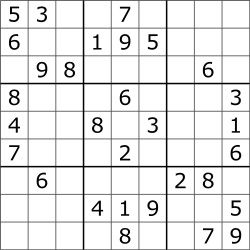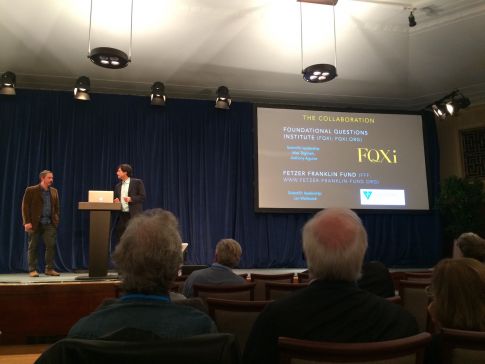
Wikipedia
Do we live in a giant Sudoku puzzle? Are real numbers really real? Does free will emerge from quantum mechanics? Consciousness? Agency? Is the future open, or already set? Is reality fundamentally random or deterministic? What is fundamental anyway? And what is the fine-tuning problem of quantum mechanics -- and how do we deal with it?
These are some of the questions on a special edition of the podcast, featuring interviews that Brendan and I recorded at the Emergent Quantum Mechanics meeting in London, in October.
First up, quantum physicist Nicolas Gisin, of the University of Geneva, makes an unconventional case for the mainstream view that quantum theory is inherently indeterministic. He starts by arguing that real numbers are not really (ontologically) real, but random -- and as a result, both classical mechanics, which is built on real numbers, and quantum mechanics are inherently indeterministic--giving us an open future.
November 24, 2017
Real numbers are not (ontologically) real, says Nicolas Gisin; living in a Sudoku Universe, with Emily Adlam; FQXi launches a new essay contest and large grant round, with Anthony Aguirre and Jan Wallaczek; & fine-tuning quantum theory, with Matt Leifer.
Full Podcast
Taking the opposing stance is Emily Adlam, an expert on the philosophy of quantum theory, at the University of Cambridge. She advocates a deterministic atemporal "Sudoku Universe." She notes that someone trying to follow the logic of a Sudoku grid, by reading numbers from the left to right, may be fooled into thinking they are looking at an undetermined probabilistic sequence of numbers. But step back and take a view of the grid as a whole, and you will see how all the seemingly random entries are uniquely determined, by atemporal rules. Maybe our universe is similarly determined, she suggests.
In addition to the fight over the (in)deterministic status of reality, the EmQM17 meeting was especially exciting for FQXi folk because we announced a couple of new initiatives there. On the podcast, Brendan tells us more about one of them: this year's essay contest, which asks "What is Fundamental?"
FQXi's directors Max Tegmark and Anthony Aguirre also teased the launch of the new large grant round on Agency in the Physical World, in partnership with the Fetzer Franklin Fund (FFF), at the meeting. This attempts to link consciousness, intelligence and agency to quantum theory. So, for the podcast, we asked Anthony and FFF's Jan Wallczek what they hope to bring out with this collaboration. Does it even make sense to link these topics together?
And finally, quantum theorist Matt Leifer of Chapman University outlines the fine-tuning problems that plague quantum theory. For instance, we know that while entanglement enables instantaneous influences between particles, this quantum property cannot be used to send useful information or signals at faster than light speeds. Yet, this feature doesn't fall naturally out of the rules of quantum theory--or out of other theories physicists are investigating that may underlie quantum theory. Instead, this constraint has to be imposed by hand. Leifer explores possible ways around such fine-tuning issues.
So, what are your (short) answers to the questions posed in the podcast? (Long answers about what is fundamental can be submitted directly to the essay contest!)

Agents in the Physical World: Aguirre and Tegmark